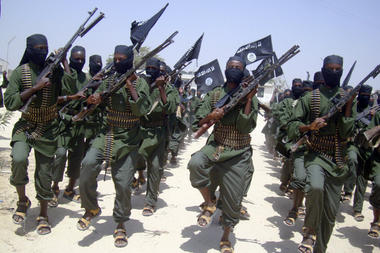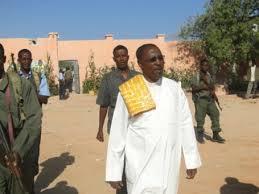By Mohamed Elmi
The U.S. State Department and many Somalis around the world have condemned the cowardly attack on the Villa Somalia Compound by al-Shabab on February 21. According to an AP report, the attack “underscores a worrying new trend in Mogadishu…many weapons given to Somalia’s military can no longer be accounted for, including rocket-propelled grenades, hand grenades and bullets.” The al-Shabab attack on the presidential compound is the culmination of a series of murderous attacks in the last couple of weeks.
The government of Hassan is hampered by accumulating evidences of graft. Current public- sentiment is catching up to a long train of abuses, corruption, embezzlement, acceptance of violence, and minimal services. President Hassan has lost all credibility; that he represents a continuation of the past has gained currency in the eyes of many local and international stakeholders. On October 30, Somalia’s central bank governor, Ms. Yussur Abrar resigned in protest for a financial scandal case that implicated the president himself and his chief of staff, Kamal Dahir Gutale; an ugly fight with his former prime minister, Said Shirdon, added to the quagmire.
![cabdiweli4]() One common view held as to the cause of the dysfunctional leadership in Mogadishu is a misalignment of priorities and reckless disregard for the needs of the public. Altuschild and Kumar (2010) defined needs as “the measurable gap between two conditions – “what is” (the current status quo) and “what should be” (the desired status or state)” People normally expect their governments to assess the extent of the needs for security, social services, good governance, and the rule of law. One would fairly expect unity of direction and the subordination of personal interest to public interest under the leadership of Hassan and his Prime Minister, Abdiweli, given the massive international support at their disposal, that they would seize the opportunity to formulate good policies, fight corruption, prioritize strategies and execute them. Instead, the performance of Hassan’s government has been dismal and disappointing.
One common view held as to the cause of the dysfunctional leadership in Mogadishu is a misalignment of priorities and reckless disregard for the needs of the public. Altuschild and Kumar (2010) defined needs as “the measurable gap between two conditions – “what is” (the current status quo) and “what should be” (the desired status or state)” People normally expect their governments to assess the extent of the needs for security, social services, good governance, and the rule of law. One would fairly expect unity of direction and the subordination of personal interest to public interest under the leadership of Hassan and his Prime Minister, Abdiweli, given the massive international support at their disposal, that they would seize the opportunity to formulate good policies, fight corruption, prioritize strategies and execute them. Instead, the performance of Hassan’s government has been dismal and disappointing.
Maladministration
Maladministration is perpetuated by international support, which emphasizes differences of approach to reinstituting the Somali statehood. Competing interests of different actor have always worked against genuine efforts to rebuild the nation. But this fact alone does not absolve Hassan’s government of public indictments. Here are some facts on Hassan’s performance:
- Aid money or grants intended to finance budget deficits are unaccounted oftentimes or diverted to personal accounts in shadow overseas banks. Western donors were rattled by the resignation of two governors of the central bank. According to Reuters, a report by “UN experts last year said they had evidence of graft in the way the central bank was run, prompting the then-governor to resign, though he denied the charges” (Reuters, 2014, Jan. 31).
- Efforts to build national security infrastructure have been severely undermined by charges of corruption. An initial assessment by the UN Monitoring Group for Somalia and Eritrea found that a large stockpile of small arms grenades and rocket-propelled grenades and other weapons are diverted to local black markets through a strong clan network. Hassan’s government has also failed to comply with “the provisions of paragraph 9 of resolution 2111” (Chopra, 2014).
- Hassan’s government has not put in place the necessary administrative and security safeguards for the management, supply, registration, and storage of national arms and ammunition, which often fall into the wrong hands.
Hassan and his cohorts has failed to execute their onerous responsibilities when, either by acting alone or in concert with others, they pursue a narrow political agenda; President Hassan is a member of an Islamist-leaning group (known as the New Blood) with which he draws much support in the daily functions and operation of his government; his tendency to micromanage the affairs of the Executive branch by concentrating power in the hands of a few loyalists is another case in point.
Another problem is the top-down international policy that prefers to concentrate all support for institution-building projects in and around Mogadishu, neglecting peripheral regions such as Puntland, Somaliland and Jubaland. This approach completely ignores the cumulative effect of two decades of social and political fragmentation in Somalia. Mogadishu is “no longer the most integrated Somali city in the Horn of Africa” as Yasin R. Ali correctly highlighted in the past. Yet the West as well as rich Arab countries is less receptive to the idea of more wider and comprehensive approach to the recovery and reconstruction of Somalia a.k.a Somalia’s New Deal: a mechanism of fair distribution and allocation of nation-building projects, limiting the influence of Mogadishu in general.
The renowned novelist Nuruddin Farah (2013) lamented the West’s indifference to President Hassan’s incompetence; the deficiency has come with a huge price as it’s evident of the latest UN report, which found many cases of graft and corruption. The sale of ammunitions and rocket-propelled grenades by a network of Abgal and Habargidir sub-clans of the Hawiye clan at the local black market has rattled the United Nations after its partial lifting of the arms embargo (Chopra, 2014). Were the consequences all known or unintended? A serious commitment to reconciling the differences of the Somali people is needed to extend the federal mandate to the rest of the country. Farah warns of the West’s predisposition to insulate Hassan’s government from legitimate concerns against his government. “In a country torn by decades of war, the number of political panhandlers scavenging for scraps on which to feed their ambitions is too great to count” (Farah, 2013)
The Turkey Phenomenon
On the other hand, Turkey has drawn a lot of criticism in Somalia. In Mogadishu, Turkey sustains the status quo of lawlessness and unaccountability through its current policy of slash fund, which it calls “cash aid”. A system of authorization and of records is absent. Policies and procedures that should account for the documentation and use of public finance is missing as the former central bank governor himself used to pick up the cash in boxes from Turkey’s embassy. To pull the invisible average person in Somalia out of abject poverty, how can we weed out corruption and scrutinize those who hold positions of authority if Turkey abets such methods of business transactions widely utilized and accepted by drug cartels?
This neocolonial policy (call it Asian trade monopolies) exploits the vulnerability of young African states. In simple terms, it goes like this: Enter the African market, avoid by all means the interference of friendly states that commit systematic violations of human rights, close every bilateral deal through the delivery of cash aid, bribe local officials to win favorable trade deals; in return, help build local infrastructures such as primary schools and roads not on the basis of equitable criteria but at the discretion of local bosses, and divert potential public and international scrutiny of questionable practices through shrewd public relations campaign.
Like the Chinese in Africa, Turkish nationals have come to Mogadishu in droves to reap fortunes in Somalia, acquiring estates for a fraction of their value and marrying local beautiful women. As concerned citizens, we strongly urge that Somali officials be held accountable for the UN reported charges of malfeasance and embezzlements (restrictions of travel and freeze on their bank accounts are necessary measures). Likewise, the international community must expose, scrutinize and censure the practice of powerful emerging Asian states roaming freely in Africa.
Mohamed Elmi
Email:ahafinance@gmail.com
—————-
References
Chopra, J. (2014). Report on the Monitoring Group for Somalia and Eritrea Pursuant to the Security Council.
Farah, N. (2013, October 14). Somalia’s Leader: Look Past the Hype. The New York Times.
The Associated Press. (2014, February 21). 9 attackers dead: Somalia president palace attack. AP.
The post SOMALIA: Rising Insecurity and the Cost of Foreign Intervention appeared first on WardheerNews.











